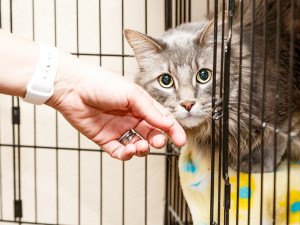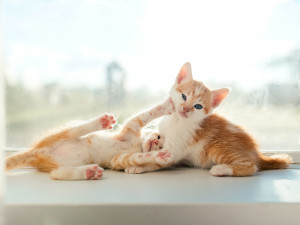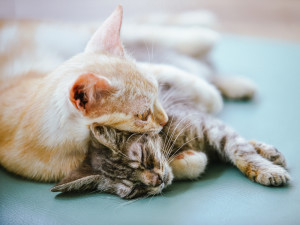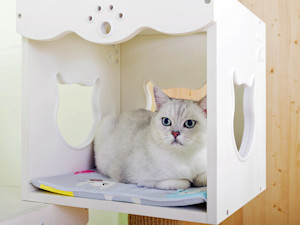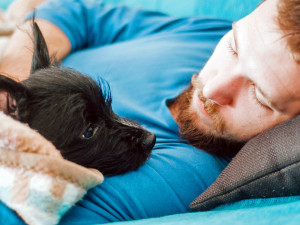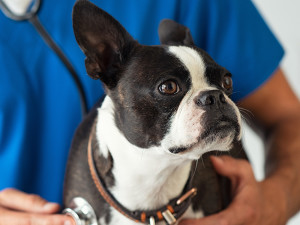How Much Does A Cat Cost?
Not sure if you can afford to bankroll a new cat for the rest of its life? Check out our comprehensive guide for all the costs involved
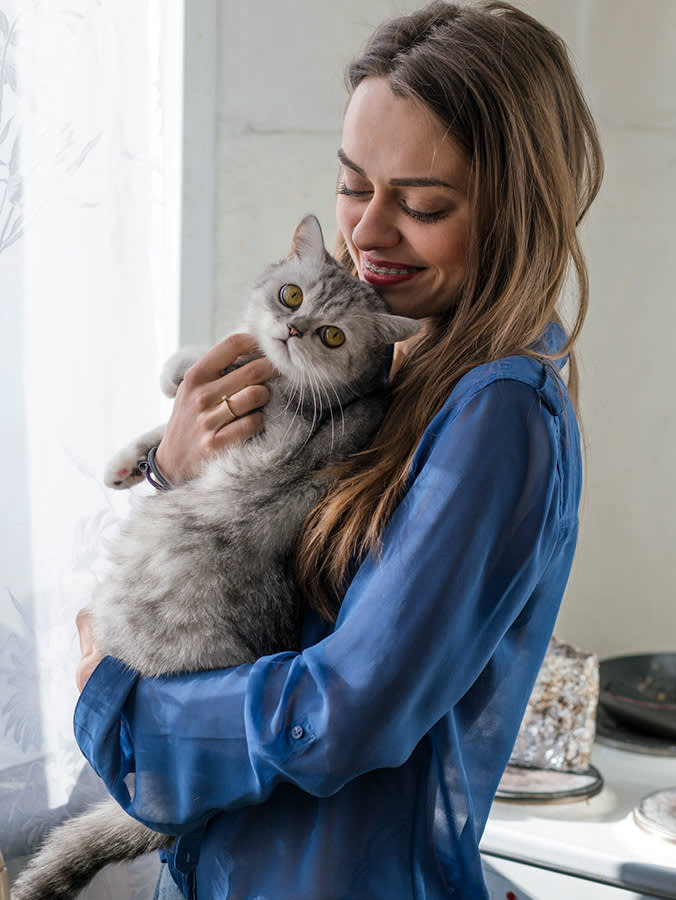
Share Article
There’s no feeling quite like bringing your new cat home and having it lay on your chest purring for the first time. Those free massages from its teeny tiny paws? Priceless! Well, not quite priceless actually. The UK’s cost of living crisis hasn’t just affected essentials like electricity bills and your supermarket shop – it’s hit the pet sector, too. The price of everything involved in keeping your cat happy and healthy has risen dramatically in recent times and some pet owners have been blindsided by these unexpected costs.
“Sadly, as the cost of living crisis continues we are seeing more and more people having to make the difficult decision to rehome their cats and dogs with us,” says Alyson Jones, director of rehoming at national pet charity Blue Crossopens in new tab. “Our teams are also taking in more pets who need clinical or behavioural help as their owners simply cannot afford vet or expert help.”
Vet Lucy Bainbridge tells us how her clients have been affected. “There have definitely been a lot of people struggling to pay for treatments and asking for payment plans, as well as a higher rate of euthanasia due to cost limitations for conditions that would have been technically treatable,” she says. Shockingly, it’s not just vet bills that owners are struggling with: “My last practice worked a lot with both local and national charities and at the beginning of the cost of living crisis we saw a disproportionate number of starvation cases coming via the charities.”
An RSPCA spokesperson tells us that the charity saw a four percent increase in the number of cats taken in between 2021–2022. The RSPCA’s 2023 survey on pet ownersopens in new tab reveals that one in eight pet owners regret getting their pet, with one in four of these stating cost as the reason.
With the average lifespan of a domestic cat ranging from 12–14 years according to Cats Protectionopens in new tab, it’s really important that all initial and future costs are considered before committing to a kitty, to alleviate stress for both yourself and your new fluffy monster.
No idea where to start? Don’t worry, we’ve done the calculations for you!
How much does a cat cost?
There are currently loads of cats in shelters waiting to woo a loving human, so that’s a good place to start when looking for a new cat. Cat adoption fees at the RSPCA and Cats Protection vary, depending on location – fees will be higher in places like London, where shelters cost more to run.
Blue Crossopens in new tab charges a standard set of fees across all locations, which starts at £175 for a kitten up to 16 weeks old, decreasing incrementally to £100 for a cat that’s eight years or older. Cats from shelters will usually come neutered and covered for fleas and worms, with a health check, microchip and at least one set of vaccinations, which should save you some money.
Adopting a cat from a country with a stray cat issue is also possible. Cyprus Prideopens in new tab House asks for a donation of £150 per cat, plus the cost of an IATA-approved travel crate, which is around £50–£75. Further afield, Lanta Animal Welfareopens in new tab in Thailand estimates that the total costs (including flights) of rehoming a cat to the UK is £900–£1,400.
If you’re after a pedigree, the Governing Council of the Cat Fancyopens in new tab (GCCF), the premier cat registration organisation in the UK dedicated to cat health, welfare and responsible breeding, has a handy tool for finding a reputable breederopens in new tab, as well as a checklistopens in new tab on what to look for when purchasing a new kitten, whether it’s from a breeder or a rescue centre. This will help you avoid coming home with a cat that has underlying medical conditions that may put you out of pocket in the future. Cats Protectionopens in new tab advises that a registered pedigree can cost from around £200 to over £1,000, depending on the breed.
Booking your first vet appointment
Once your cat’s home and settled, it’s time to register with a local vet. “If your cat or kitten is coming from a shelter, they may well come with initial vaccines etc done already, but a health check after rescue is never a bad thing,” advises vet Joanna Mockford. “It can pick up any issues that may have developed, and it’s good for your cat to have an experience at the vets without any needles or tests involved. If your cat hasn’t been vaccinated, we’ll do a general health check at the time of vaccination. If we do find an issue, we’ll hold off on vaccination until we’ve figured out what’s wrong.”
In the UK, core vaccinesopens in new tab include protection from feline parvovirus (FPV), feline herpesvirus (FHV) and feline calicivirus (FCV). According to the RSPCA , a kitten’s first set of vaccines should be done at nine weeks, followed by a second dose at 12 weeks, and then a yearly booster.
“You should also get your kitten desexed once they’re a little older, but before they go out and mix with the world or other cats of the same gender,” adds Joanna. “We can neuter from as young as 16 weeks, but your practice may have their own policy on age.”
If your cat or kitten comes from a shelter, or you don’t know their background, Joanna also advises getting them tested for feline immunodeficiency virus (FIV) and feline leukaemia virus (FeLV): “These are two infectious diseases that can be passed from mum to kitten. They’re not necessarily a death sentence, but they can have ramifications for health and may affect a decision to get a second cat in the future.”
The PDSAopens in new tab advises that kittens are given their first worming treatment at three weeks old, and wormed every two weeks until they’re 16 weeks old. After that, it’s usually recommended to worm every three to six months, although your vet will advise on this. As for flea and tick preventatives, the Blue Crossopens in new tab states that these can be given from eight weeks old, and are usually administered monthly.
Microchipping your cat will be a legal requirement in the UK from 10 June, 2024opens in new tab – after this date, all cats who are 20 weeks and older must be chipped and registered on a database.
Of course, it’s not over once your cat has had its initial vet visit – if your pet gets sick or injured, do you have enough money to cover that? Vet consultation fees vary depending on your location and whether the practice is independent or owned by a large corporation. Research from VetHelpDirectopens in new tab reveals that an initial consultation can cost as much as £85 in London, and as little as £32.50 in Dumfries and Galloway. You’ve probably heard fellow pet owners grumbling about the cost of taking their animal to the vets. This is no surprise considering fees have risen so much in the UK that the Competitions and Market Authorityopens in new tab (CMA) is planning to launch a formal investigation.
Pet insurance may help cover costs, but this depends on the type of policy you go for. Lifetime cover is the most expensive yet comprehensive option, ensuring your cat is covered for its entire lifespan, including any chronic illnesses. The cheapest is accident-only, which covers for unexpected injuries, but not for illness. The cost of insurance will vary depending on where you live – data from GoCompareopens in new tab shows that London has the highest average annual pet insurance premium at £419, with the North East being the cheapest at £339. Domestic shorthairs and moggies are the cheapest to insure at an annual average of £180.82 and £200.43 respectively, while you can expect to pay a higher premium for a pedigree, as these are more prone to hereditary health conditions. The priciest puss to insure is the Maine Coon, costing an annual average of £309.21.
To give you an idea of what you’ll have to shell out on your cat, we’ve collated some estimates.
Regular consultation: £32.50–£85
Emergency consultation (out of hours): ~£250
Spay (female): £50–£100
Castration (male): £40–£80
Microchipping: £20–£30
Flea/tick preventatives (monthly cost): £2.50–£7
Wormer (every three months): £2–£8.50
Primary kitten vaccines (one-off, including feline leukaemia virus)*: £47–£129
Primary kitten vaccines (one-off, not including feline leukaemia virus)*: £55–£152
Booster vaccines (annual)*: £61–£70
Vaccine information taken from a survey of veterinary clinics in England, Scotland and Wales, conducted by ManyPetsopens in new tab.
Shopping for supplies
Buying all the fun (and necessary) bits for your cat is almost as enjoyable as choosing the cat itself! However, it may also be more expensive than the cat itself. We’ve detailed below all the supplies you’ll likely need, shopping around for both budget and high-end options to give you an idea of what’s available. For example, do you want (or need) a standard cat flap or a newfangled microchip flap with all the bells and whistles?
When it comes to food, dry food is more affordable than wet, which you can buy in pouches from the supermarket or have delivered fresh to your door from a luxury, bespoke provider. While it’s not necessary to buy the most expensive food on the market, it’s important to note that the cheapest food won’t be of the highest quality. When it comes to feeding a kitten, remember that they’ll require more food as they get bigger, which will gradually increase costs. However, buying bulk can help save you money.
Food (per month): £3.50–£60+
Treats (per small bag): £0.70–£4
Collar: £1–£55
Food and water bowls (per bowl): £1–£62
Cat litter tray/box: £2–£75
Cat litter scoop: £1–£12
Cat litter (per 5 litre bag): £3.50–£9
Cat litter tray/box liners (per pack of six): £1–£4
Cat litter disinfectant: £4–£5
Cat carrier: £10–£70
Cat shampoo: £4–£20
Bed: £7–£130
Scratching post: £8–£40
Toys: £1–£15
Cat flap: £10–£215
Grooming brush: £3–£22
Handy services
Despite being smaller creatures, cat grooming tends to be more expensive than dog grooming due to the sassy nature of our sharp-clawed felines. There’s more danger involved when it comes to cats, which is reflected in the pricing. Unless you have a trusted friend or family member to look after your precious puss when you go away, you’ll likely need to use a cattery, which should be factored into your holiday budget. Don’t forget that costs for these services are usually higher in more expensive locations, like London.
Grooming (full groom, per visit): £26–£180
Cattery (per 24 hours): £11–£40
That’s it! While we’re definitely not trying to put you off getting a new cat, we do think it’s important to spend some time crunching those numbers to avoid ending up in an emotional and financial pickle in the future. Done the calculations and still feel able to welcome a new furry friend into your life? Meow-vellous!
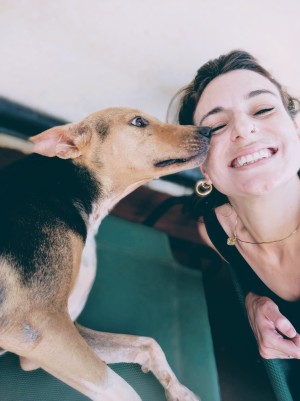
Lisa Bowman
Lisa is a writer whose work has been featured in the likes of Stylist, Metro and The Guardian. She spends her days at a computer so she can bankroll her two rescue dogs, who may or may not be The Cutest Dogs in the World.
Related articles
![Cat cleaning themself]()
Why You Should Spay or Neuter Your Cat
A cautionary tale about a cat in heat
What Are The Different Types Of Pet Insurance?
Everything you need to know about how pet insurance works in the UK
![two bonded kittens snuggling]()
Why You Should Adopt a ‘Less Adoptable’ Cat
Here’s why bonded kitties, senior cats and felines with FIV make just as amazing pets as any other
![French bulldog being examined at the vet via stethoscope]()
9 Tips For Saving Money At the Vet
Ways to lower your bill – without compromising your pet’s health

